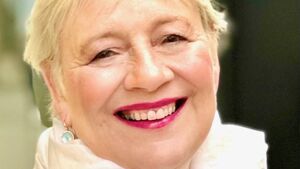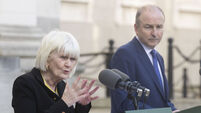'No money could give me this fulfilment'

Westport woman Tereasa McGuire has found fulfilment in her work as a death doula.
Tereasa McGuire has done many things in her life so far. She was a teacher, an assistant pharmacist, a local politician, and is now a qualified psychotherapist and death doula.
You wouldn’t put some of those jobs together for one person in one lifetime but with Tereasa, you can see how she made all of them work for her at different stages.
She is refreshingly honest about her life when we sit down to chat in her home outside Westport. She has experienced many things during her varied career, some not easy, but they have shaped her into the person she is today and the path she is on.
Angelina: Tereasa, thanks for sitting down to chat. Tell us a little about your background.
Tereasa: I was born and bred in Westport - in a pub on Mill Street. I am one of those people who had an absolutely idyllic childhood, played on the streets, etc. I was loved, I was minded, I was nurtured, and I had a wonderful family. I went on holiday down to my aunt in Sligo every summer.
As regards school, I wanted to go to boarding school because I had read Enid Blyton! I went to Tourmakeady and I loved it.
And then I always wanted to teach. At the time, there was an interview process, even though I had the points and I didn’t pass the interview. So I went off and did an assistant pharmacy course for four years. Then they reduced the mature student age down to 22 or 23, so I went back to St Pat’s and I had to do my full three years. When I finished I applied for jobs. I got one in Athlone and I was in a special class. And the first day I stood in that classroom, I had a real feeling that this was where I was meant to be. My love was around special education and I did the Diploma in Special Education for a year.
Angelina: Where did politics come into it then Tereasa?
Tereasa: I was always on the fringes of politics. I suppose I ran for politics because my nature is - I’m a two on the enneagram, the needy caretaker, so my heart will always want to help.
I had 15 wonderful years on Westport Town Council. I first ran in the late ‘90s. I loved the Town Council because you were really connected with people. The area was small. Interestingly, Séan Staunton, Patrick Durcan and Margaret Adams were probably the three most powerful influences on me. In those days, there wasn’t the political backstabbing and biting within the Town Council. Now, it wasn’t all sunshine and roses either, but the nine people sitting around that table had Westport interests at heart.
Angelina: There was a common goal to work together to improve the town?
Tereasa: Yes, a collegiality and a connectedness for the greater vision of the town. I am still in touch with people I connected with during my time in the Town Council. I’d say that the Town Council gave me friendships, the Town Council gave me my husband Robert because I met him out in the middle of Clew Bay when the Irish Lights Ship was turning on the lights. So the Town Council gave me a lovely grounding and the County Council was a very different animal. I suppose, if I was to be very honest, I should have honoured my own gut and not ran. Now, the first time was all right because it was an adventure. The second time, I found it more difficult. The area was very big and I was teaching in Drummin - I was a teaching principal and at the end, I was a single-teacher teaching principal. But it was a very different energy in that second election to the County Council.
Angelina: Can I ask you how it felt to lose your seat?
Tereasa: It was awful. It was a rejection, it was humiliation. And it’s interesting the things you remember. Robert is a real political anorak and he could see the writing on the wall. Numbers and figures mean nothing to me. I can remember people’s stories about their father or their mother or their granny or their child. But he could see the transfers weren’t coming and blah, blah, blah. But John Condon (returning officer) brought me inside and he said ‘You know, in about 10 minutes I’m going to have to declare, that you’re eliminated’. I cried then and I remember thinking, you’re not going out crying and I didn’t. I made a very conscious decision to walk away after that.
I don’t know that I would have had the courage to walk away because I’d feel a loyalty to the party, a loyalty to the town. So I think it was the best way for it to happen for me.
Angelina: But tell us then about the other side of it, the psychotherapy - you had a love for that over a number of years?
Tereasa: I did the degree [in Athlone IT] during the Covid lockdown. I am one of those people that lockdown suited. I didn’t have to travel to Athlone - we did an awful lot online. Now you miss a lot of the connective energy, but it did suit me. And then for my dissertation, my dissertation was called ‘Dying to Talk - How the psychotherapist can facilitate the death conversation’. I’m actually drafting a book called ‘Dying to Talk’ at the minute. I have a huge interest in death and dying, and I am absolutely fascinated how we Irish, we can celebrate at the wake, we can do everything. But we can’t sit for the month beforehand and talk to the person. I have a huge interest then in those different approaches.
Angelina: So what happens when someone reaches out to you as a death doula?
Tereasa: Sometimes a family member rings on the person’s behalf and I will gently tell them that when the person themselves wants to talk to me, I will gladly talk to them but they have to do it. If it’s somebody young, the mother or father might ring and say their loved one wants to talk to someone like me and I will go and talk them then.
Sometimes, the needs are very gentle.
For example, I spent a day in the zoo with an older man - it was on his wish list. I have helped people write letters to estranged family members. I have helped them to lay out what they want.
And sometimes it’s easier for the person who’s on that final journey to talk to me because they feel I don’t have an emotional investment, whereas if they talk to their family, they’re adding another burden onto them.
I would have a deep spiritual side to me. I think I’m very lucky because I do believe there’s another life.
The greatest gift I bring to this is my heart. And the essence of who I am. And in that heart, there’s a spiritual side that’s non-denominational. I happen to be Christian, but it doesn’t matter.
Angelina: What is the main thing a death doula does for someone?
Tereasa: It’s just being there for the person - be it physically or mentally or spiritually or emotionally – so that the person can feel, yes, there’s somebody here with me. And that’s basically what it is.
Angelina: What are your hopes and aspirations around the role of a death doula?
Tereasa: It would be that every hospital would have the facility of a death doula, that any institution or indeed anybody who needs or wants it would have access and that cost wouldn’t be prohibitive. And that those who work in this industry, in the industry of caring for people on their final journey, wouldn’t feel threatened.
There’s not one way to care for one person. There’s not only one way to care for people.
There’s a thousand million ways. If we could make that last chapter of someone’s life a bit more bearable, then it’s worth doing. We’re definitely doing it in hospices with pain management and psychotherapy and all that. But we need to make the soul journey with people because the body will be looked after.
Medicine is so much to the fore. But we need the people journey. We need people to connect and we need that awful loneliness that comes with getting a bad news story or terminal illness diagnosis. A GP would have a list of Death Doulas like he’d have a list of psychotherapists.
In that brokenness, there’s growth. In that brokenness, there can be peace.
We don’t all have to be whole. We don’t all have to be complete, but we all have to be acknowledged.
Angelina: Do you feel fulfilled on this path Tereasa?
Tereasa: There’s no money that could give me this fulfillment.
It’s magical and spiritual and very beautiful. I know it’s sad, but it’s a very beautiful sacred space to be in. You know when you see a mother with her baby and you know there’s that bond and it’s so special, you can actually see the energy around it.
I’d be hoping that if I was in a room or in a hospice or a hospital with someone, they’d feel that security that they are cared for, that there’s somebody advocating for them, who’s on their side, who’s not getting involved in the politics and in the paperwork.
I have no one else’s interest but the person whom I serve.





